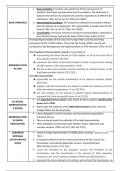positions, but it does not determine the EU's positions. This distinction is
based on the division of competencies and the competences of different EU
institutions. (TEU: Art 16, Art 29; TFEU: Art 218(9))
BASIC PRINCIPLES 2. Determining EU positions: The authority to determine EU positions follows
from the division of competencies. This responsibility is usually more for the
Council. (TEU: Art 16, Art 29; TFEU: Art 218(9))
3. Coordination: It ensures coherence among EU representations, especially in
the Common Foreign and Security Policy (CFSP) under Article 34 TEU.
The High Representative of the Union for Foreign Affairs and Security Policy
represents the EU in CFSP matters. They chair the Foreign Affairs Council and
contribute to the development and implementation of CFSP decisions. (TEU: Art 27)
The President of the European Council is responsible for
representing the Union abroad on CFSP matters ‘at his or her level and in
that capacity’ (Article 15(6) TEU)
represents the Union at the level of heads of state or government, leaving
REPRESENTATION all other aspects of EU representation in CFSP
IN CFSP: the day-to-day representation and the meetings at ministerial level, to the
High Representative (Article 27(2) TEU).
The high representative
responsible for the overall coordination of EU external relations (Article
18(4) TEU)
together with the Commission are tasked to handle the relations of the EU
with international organisations art 220 TFEU
can also propose to the Council to appoint Special Representatives to
represent the Union on specific issues art 33 TEU
are appointed by the Council under Article 33 TEU to address specific policy
EU SPECIAL
issues within CFSP.
REPRESENTATIVE
Work under the authority of the High Representative of the Union for
S (EUSRS)
Foreign Affairs and Security Policy.
Union delegations in third countries and international organizations
REPRESENTATION represent the EU.
IN UNION They are placed under the authority of the High Representative.
DELEGATIONS: These delegations work closely with Member States' diplomatic and
consular missions. (TFEU: Art 221; TEU: Art 27(3))
EUROPEAN assists the High Representative in fulfilling their mandate. (Article 221(2)
EXTERNAL TFEU)
ACTION SERVICE It comprises officials from the General Secretariat of the Council, the
(EEAS) Commission, and national diplomatic services. (Council Decision
2010/427/EU) (Article 27(3) TEU)
‘assist the President of the European Council, the President of the
Commission, and the Commission in the exercise of their respective
functions in the area of external relations’ (Article 2(2) EEAS Decision)
represent the Union abroad in its entirety and not just the Commission, as
, used to be the case (Article 221(1) TFEU; Article 5 EEAS Decision)
they receive instructions from the High Representative for matters touching
on CFSP and the Commission on non-CFSP policies (Article 5(3) EEAS
Decision).
EU representation focuses on expressing the EU's position, not the
individual Member States' positions.
MIXITY, MEMBER
Member States have the freedom to choose whether an EU actor or the
STATES, AND
Council rotating Presidency represents their position.
ARRANGEMENTS
However, coordination is necessary to ensure unity in external
representation. (Case C-161/20)
The EU establishes appropriate cooperation with international organizations
and implements it through the High Representative and the Commission.
(TFEU: Art 220, Art 221(1))
Third parties may not permit the full application of EU rules, requiring
flexibility in external representation.
REPRESENTATION The EU's status in different international organizations varies, such as full
IN membership, observer status, or Member States exercising EU competence.
INTERNATIONAL C-161/20, Commission v Council
ORGANIZATIONS o the Commission has the competence to represent the EU in all
matters except CFSP
o However, when the EU acts internationally, it must follow the rules
of international law. Member States can choose the Commission to
represent them jointly.


